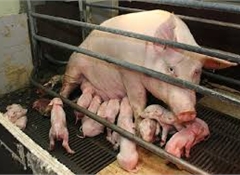News
59% support factory farming ban
15 Sep 14

A HorizonPoll survey finds adult New Zealanders agree, by large majorities, that factory farming should be banned.
The survey of 1,799 respondents aged 18+, conducted between August 18 and 23, 2014, finds:
- In general, factory farming in New Zealand should be banned (59.1% support, 21.1% oppose)
- Support for a ban occurs among those who voted in 2011 for 5 of 7 parties, with more opposed than supportive among voters for minor parties Act and the Maori Party only. Some 1.16 million voters for parties at the 2011 general election support a ban on factory farming.
In relation to specific factory farming methods -
Farrowing crates:
- 76.7% believe the use of farrowing crates measuring about 70cm wide by 210cm long to confine sows for four weeks after they give birth, to avoid sows rolling on their piglets, is inhumane and the crates should be banned.
This strong agreement reduces if it were to result in higher prices. Some 46.8% say crates are inhumane and should be banned but they cannot afford to pay more for pork.
40.5% agreed they would continue to buy New Zealand pork regardless of whether farrowing crates are used or not.
28.5% agreed they would stop buying pork if the crates were not banned, indicating a significant potential risk to the pork industry.
This is the equivalent of 911,700 adults, living in about 447,600 households, and suggests there is a potential for large consumer resistance to buying pork perceived to be inhumanely produced. Further research would be needed to quantify the extent to which consumers would definitely act on this intention.
Colony cages:
Colony cages are now being introduced by egg producers to provide laying hens with more room (an extra area about the size of a postcard). However the survey finds:
- 71.8% agree (42.5% strongly) that colony cages do not provide enough space and are not an acceptable alternative to current battery hen cages. 7.3% only disagree with this view. The percentage disagreeing with the move to colony cages equates to about 2,296,800 million adults.
- 63.8% agree colony cages should be banned. This is the equivalent of about 2,040,900 adults. 12.0% disagree, while 18.4% are neutral and 5.8% are not sure.
Affordability of eggs, if a ban results in higher egg prices, is of less concern than with pork.
- 18.4% agree colony cages should not be banned if this results in egg price rises
- Some 31.3% of adults (equivalent to about 1,001,300 adults living in about 491,600 households) agree they would like colony cages banned but cannot afford to pay more for eggs
- 38.7% (equivalent to 1,238,000 adults) disagree that they cannot afford to pay more if there were a ban.
Those with primary and equal responsibility of household decisions, however, are more inclined to agree with statements that they would stop buying pork and would be less able to afford eggs if factory farming were banned.
Impact on party vote:
The survey indicates a party offering a policy, at the September 20, 2014 general election, to ban factory farming is likely to be more attractive than unattractive to electors overall.
Some 20.2% say they would definitely vote for a party with that policy.
Overall, 64.7% of adults say they would definitely or might vote at the September 20 general election for a party which has a policy to end factory farming.
This result does not predict how electors will cast their party vote, but their preferred policy in relation to this issue when casting that vote.
Those indicating they would definitely vote for a party with a factory farming ban policy is likely to be more indicative of the degree to which a policy like this will influence a final voting decision.
“Definite” influence of a banning policy for those who cast a vote for these parties at the 2011 general election is:
- Act 18.2% (48.8% would definitely not vote for a party with a banning policy)
- Conservative 4.8%
- Green 43.9%
- Labour 26.7%
- Mana 25.4%
- Maori party 15.2%
- National 13.2%
- NZ First 11.2%
- United Future 6.2%
The survey was commissioned by the animal rights group SAFE.
Respondents are members of the HorizonPoll online panel, recruited to match the New Zealand population aged 18+.
The survey is weighted by age, gender, region, personal income, educational qualification level, and party vote 2011 to provide a representative sample of the New Zealand adult population. At a confidence level of 95%, the maximum margin of error is +/- 2.3%.
DOWNLOAD A FULL COPY OF THE REPORT (PDF)
VIEW A 13 MINUTE MULTI-PARTY DEBATE ON POLICY
For further information please contact
Grant McInman, Manager, Horizon Research
E-mail: gmcinman@horizonresearch.co.nz
Telephone: +64 21 076 2040
HorizonPoll Online Survey system
and website developed by BEWEB
Copyright © 2010. HorizonPoll incorporating ShapeNZ - Listening to New Zealand


